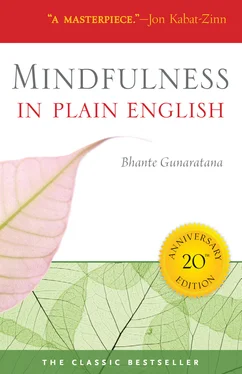Henepola Gunaratana - Mindfulness in Plain English
Здесь есть возможность читать онлайн «Henepola Gunaratana - Mindfulness in Plain English» весь текст электронной книги совершенно бесплатно (целиком полную версию без сокращений). В некоторых случаях можно слушать аудио, скачать через торрент в формате fb2 и присутствует краткое содержание. Жанр: Самосовершенствование, на английском языке. Описание произведения, (предисловие) а так же отзывы посетителей доступны на портале библиотеки ЛибКат.
- Название:Mindfulness in Plain English
- Автор:
- Жанр:
- Год:неизвестен
- ISBN:нет данных
- Рейтинг книги:3 / 5. Голосов: 1
-
Избранное:Добавить в избранное
- Отзывы:
-
Ваша оценка:
- 60
- 1
- 2
- 3
- 4
- 5
Mindfulness in Plain English: краткое содержание, описание и аннотация
Предлагаем к чтению аннотацию, описание, краткое содержание или предисловие (зависит от того, что написал сам автор книги «Mindfulness in Plain English»). Если вы не нашли необходимую информацию о книге — напишите в комментариях, мы постараемся отыскать её.
Mindfulness in Plain English — читать онлайн бесплатно полную книгу (весь текст) целиком
Ниже представлен текст книги, разбитый по страницам. Система сохранения места последней прочитанной страницы, позволяет с удобством читать онлайн бесплатно книгу «Mindfulness in Plain English», без необходимости каждый раз заново искать на чём Вы остановились. Поставьте закладку, и сможете в любой момент перейти на страницу, на которой закончили чтение.
Интервал:
Закладка:
Life seems to be a perpetual struggle, some enormous effort against staggering odds. And what is our solution to all this dissatisfaction? We get stuck in the ‘If only’ syndrome. If only I had more money, then I would be happy. If only I can find somebody who really loves me, if only I can lose 20 pounds, if only I had a color TV, Jacuzzi, and curly hair, and on and on forever. So where does all this junk come from and more important, what can we do about it? It comes from the conditions of our own minds. It is deep, subtle and pervasive set of mental habits, a Gordian knot which we have built up bit by bit and we can unravel just the same way, one piece at a time. We can tune up our awareness, dredge up each separate piece and bring it out into the light. We can make the unconscious conscious, slowly, one piece at a time.
The essence of our experience is change. Change is incessant. Moment by moment life flows by and it is never the same. Perpetual alteration is the essence of the perceptual universe. A thought springs up in you head and half a second later, it is gone. In comes another one, and that is gone too. A sound strikes your ears and then silence. Open your eyes and the world pours in, blink and it is gone. People come into your life and they leave again. Friends go, relatives die. Your fortunes go up and they go down. Sometimes you win and just as often you lose. It is incessant: change, change, change. No two moments ever the same.
There is not a thing wrong with this. It is the nature of the universe. But human culture has taught u some odd responses to this endless flowing. We categorize experiences. We try to stick each perception, every mental change in this endless flow into one of three mental pigeon holes. It is good, or it is bad, or it is neutral. Then, according to which box we stick it in, we perceive with a set of fixed habitual mental responses. If a particular perception has been labeled ‘good’, then we try to freeze time right there. We grab onto that particular thought, we fondle it, we hold it, we try to keep it from escaping. When that does not work, we go all-out in an effort to repeat the experience which caused that thought. Let us call this mental habit ‘grasping’.
Over on the other side of the mind lies the box labeled ‘bad’. When we perceive something ‘bad’, we try to push it away. We try to deny it, reject it, get rid of it any way we can. We fight against our own experience. We run from pieces of ourselves. Let us call this mental habit ‘rejecting’. Between these two reactions lies the neutral box. Here we place the experiences which are neither good nor bad. They are tepid, neutral, uninteresting and boring. We pack experience away in the neutral box so that we can ignore it and thus return jour attention to where the action is, namely our endless round of desire and aversion. This category of experience gets robbed of its fair share of our attention. Let us call this mental habit ‘ignoring’. The direct result of all this lunacy is a perpetual treadmill race to nowhere, endlessly pounding after pleasure, endlessly fleeing from pain, endlessly ignoring 90 percent of our experience. Than wondering why life tastes so flat. In the final analysis, it’s a system that does not work.
No matter how hard you pursue pleasure and success, there are times when you fail. No matter how fast you flee, there are times when pain catches up with you. And in between those times, life is so boring you could scream. Our minds are full of opinions and criticisms. We have built walls all around ourselves and we are trapped with the prison of our own lies and dislikes. We suffer.
Suffering is big word in Buddhist thought. It is a key term and it should be thoroughly understood. The Pali word is ‘dukkha’, and it does not just mean the agony of the body. It means the deep, subtle sense of unsatisfactoriness which is a part of every mental treadmill. The essence of life is suffering, said the Buddha. At first glance this seems exceedingly morbid and pessimistic. It even seems untrue. After all, there are plenty of times when we are happy. Aren’t there? No, there are not. It just seems that way. Take any moment when you feel really fulfilled and examine it closely. Down under the joy, you will find that subtle, all-pervasive undercurrent of tension, that no matter how great the moment is, it is going to end. No matter how much you just gained, you are either going to lose some of it or spend the rest of your days guarding what you have got and scheming how to get more. And in the end, you are going to die. In the end, you lose everything. It is all transitory.
Sounds pretty bleak, doesn’t it? Luckily it’s not; not at all. It only sounds bleak when you view it from the level of ordinary mental perspective, the very level at which the treadmill mechanism operates. Down under that level lies another whole perspective, a completely different way to look at the universe. It is a level of functioning where the mind does not try to freeze time, where we do not grasp onto our experience as it flows by, where we do not try to block things out and ignore them. It is a level of experience beyond good and bad, beyond pleasure and pain. It is a lovely way to perceive the world, and it is a learnable skill. It is not easy, but is learnable.
Happiness and peace. Those are really the prime issues in human existence. That is what all of us are seeking. This often is a bit hard to see because we cover up those basic goals with layers of surface objectives. We want food, we want money, we want sex, possessions and respect. We even say to ourselves that the idea of ‘happiness’ is too abstract: “Look, I am practical. Just give me enough money and I will buy all the happiness I need.” Unfortunately, this is an attitude that does not work. Examine each of these goals and you will find they are superficial. You want food. Why? Because I am hungry. So you are hungry, so what? Well if I eat, I won’t be hungry and then I’ll feel good. Ah ha! Feel good! Now there is a real item. What we really seek is not the surface goals. They are just means to an end. What we are really after is the feeling of relief that comes when the drive is satisfied. Relief, relaxation and an end to the tension. Peace, happiness, no more yearning.
So what is this happiness? For most of us, the perfect happiness would mean getting everything we wanted, being in control of everything, playing Caesar, making the whole world dance a jig according to our every whim. Once again, it does not work that way. Take a look at the people in history who have actually held this ultimate power. These were not happy people. Most assuredly they were not men at peace with themselves. Why? Because they were driven to control the world totally and absolutely and they could not. They wanted to control all men and there remained men who refused to be controlled. They could not control the stars. They still got sick. They still had to die.
You can’t ever get everything you want. It is impossible. Luckily, there is another option. You can learn to control your mind, to step outside of this endless cycle of desire and aversion. You can learn to not want what you want, to recognize desires but not be controlled by them. This does not mean that you lie down on the road and invite everybody to walk all over you. It means that you continue to live a very normal-looking life, but live from a whole new viewpoint. You do the things that a person must do, but you are free from that obsessive, compulsive drivenness of your own desires. You want something, but you don’t need to chase after it. You fear something, but you don’t need to stand there quaking in your boots. This sort of mental culture is very difficult. It takes years. But trying to control everything is impossible, and the difficult is preferable to the impossible.
Читать дальшеИнтервал:
Закладка:
Похожие книги на «Mindfulness in Plain English»
Представляем Вашему вниманию похожие книги на «Mindfulness in Plain English» списком для выбора. Мы отобрали схожую по названию и смыслу литературу в надежде предоставить читателям больше вариантов отыскать новые, интересные, ещё непрочитанные произведения.
Обсуждение, отзывы о книге «Mindfulness in Plain English» и просто собственные мнения читателей. Оставьте ваши комментарии, напишите, что Вы думаете о произведении, его смысле или главных героях. Укажите что конкретно понравилось, а что нет, и почему Вы так считаете.












